PM Benjamin Netanyahu approved attack during security consultations with senior ministers and intelligence chiefs earlier this week, Israeli news website Walla reports, citing unnamed American officials.

At least nine people, including a child, were killed and some 3,000 wounded in a mass explosion of the pager devices in different areas across Lebanon.
The website, citing unnamed senior American officials, reported on Tuesday that Israel was behind the explosions in Lebanon that killed nine people and wounded nearly 3,000, including 200 in critical condition, despite the Israeli Prime Minister's Office distancing itself from a now-deleted social media post by Netanyahu's advisor, Topaz Luk, which hinted at Israeli responsibility for the attacks.
Pagers, often used by civilians and healthcare workers for communication, are small, battery-powered wireless devices that receive text messages, audio, and visual signals.
According to Walla, the operation "neutralised a significant part of Hezbollah's military command and control system."
Hezbollah confirmed that at least two members were killed and many others wounded in the mass explosion.
Israeli officials said that "they are aware that there is now a high probability of a significant escalation on the northern border" and emphasised that the Israeli army is on "high alert for a large-scale response by Hezbollah."
An unnamed Israeli source told the website that the operation to blow up the pagers was approved at the beginning of the week as part of a series of security consultations held by Netanyahu with senior ministers and heads of the defence establishment and the intelligence community.

Schools suspended
Meanwhile, Lebanon announced the closure of all schools and educational institutions across the country on Wednesday.
"We announce the closure of public and private schools, the Lebanese University, and all private higher education institutions tomorrow, Wednesday, in condemnation of the criminal act committed by the Israeli enemy against citizens," said Abbas Halabi, the country's education minister on Tuesday.
The Lebanese minister also called on the "global conscience to stop the Israeli killing machine, which shows no mercy or distinction, and has committed an unprecedented collective crime against the Lebanese people."
Lebanese media blamed the devices exploded after an Israeli breach of the communication system.
Hezbollah held Israel fully responsible for the wireless explosions and vowed "just retaliation from unexpected quarters" to Tel Aviv.
The Lebanese Health Ministry earlier urged all citizens who own the pager communication devices to immediately dispose of them.

US distances itself
The State Department said that the US is gathering information about the attack while distancing itself from it.
"I can tell you that the US was not involved in it. The US was not aware of this incident in advance. And at this point, we're gathering information," spokesman Matt Miller told reporters.
Spokesman Air Force Major General Pat Ryder said there is "no change to US force posture" in the Middle East.
Ryder said that Defence Secretary Lloyd Austin spoke to his Israeli counterpart Yoav Gallant on Tuesday without giving further information on whether they held a phone call before or after the attack.
A combination of hardware and software might been used in the attack.

People gather outside the American University hospital after the arrival of several men who were wounded by exploded handheld pagers, in Beirut, Lebanon. / Photo: AP
The available information about the series of pager explosions that have left more than a thousand people injured in Lebanon indicates that it is a case of a cyberattack, says a leading security expert.
“Whoever did this has found a way to explode the batteries or a deployed explosive through external stimulus,” says Olav Lysne, a Norway-based computer scientist and author of The Huawei and Snowden Questions.
“Usually such attacks are involved in ransomware. But we have had some examples, most notably the Stuxnet attack that targeted Iranian centrifuges.”
Pagers are obsolete wireless devices that were popular in the 1980s and 1990s before the advent of cellular phones.
Simpler to use and offering more privacy, some people and organisations still prefer to rely on them for day-to-day communication needs.
“It’s old-fashioned technology that’s hard to track,” says Lysne.
The Norwegian computer scientist believes that a combination of software and hardware tools might have been used to carry out the detonations of pagers in Lebanon.
“Security people have been talking about exactly this scenario.”
Over a thousand people were wounded in pager explosions across Lebanon. Hezbollah members and Iran’s ambassador to Lebanon, Mojtaba Amani, were also among the injured.
Sources suggest Israeli involvement through communication system hacks pic.twitter.com/sNTbQ722Bs— TRT World (@trtworld) September 17, 2024
Reports suggest that at least eight people have been killed and more than a thousand injured in the explosions.
Batteries in electronic devices like pagers and smartphones can store an incredible amount of energy, says Lysne.
“It’s a combination of chemicals, and that’s why you see a lot of fire if you ignite a battery.”
While no one has claimed responsibility for what appears to be a coordinated attack, Hezbollah is saying many of its members have been injured.
The Lebanese group has been engaged in border clashes with Israeli forces since war broke out in Gaza in October last year.
Israeli media reports say that Prime Minister Benjamin Netanyahu is preparing to launch a broader attack on Hezbollah, which has fired missiles and rockets into Israeli territory and forced Jewish residents to flee their homes.
But Lysne says the most concerning bit about such a cyberattack is that it has exposed the vulnerability in even devices based on old tech.
“We are waiting for more information. But this can be a wake-up call for everyone. This could possibly mean that no device is safe.”
Hezbollah confirms at least 2 members killed, many injured in mass explosion of pager devices
Rania Abu Shamala |17.09.2024 - TRT/AA

ISTANBUL
At least nine people, including a child, were killed in a mass explosion of wireless communication devices known as pagers in different areas in Lebanon, Health Minister Firas Al-Abiad said on Tuesday.
Some 2,750 other people were also injured, including 200 in critical condition, in an initial toll, he added at a press conference in Beirut.
The minister told Anadolu early Tuesday that hundreds of people were injured in the mass device explosions across Lebanon.
Lebanese media suggested that the devices exploded after an Israeli breach of the communication system.
Hezbollah confirmed that at least two members were killed and many others injured in the mass explosion.
“At approximately 3:30 PM (1:30 PM GMT) on Tuesday, Sept. 17, 2024, several pager devices used by various members of Hezbollah units and institutions exploded,” the group said in a statement.
The group held Israel fully responsible for the wireless explosions and vowed “just retaliation from unexpected quarters” to Tel Aviv.
There was no immediate comment from Israel on the explosions in Lebanon.
Early Tuesday, Topaz Luk, a close adviser to Israeli Prime Minister Benjamin Netanyahu, hinted in a post on X that Israel was behind the explosions of the wireless radio devices throughout Lebanon. He later deleted the post.
Netanyahu’s office, however, issued a statement distancing the prime minister from his adviser’s post.
The Lebanese Health Ministry earlier urged all citizens who own the pager communication devices to immediately dispose of them.
The mass explosion came amid an exchange of cross-border attacks between Hezbollah and Israel against the backdrop of a brutal Israeli offensive on the Gaza Strip, which has killed more than 41,200 people, mostly women and children, following a Hamas attack Oct. 7 last year.
*Writing by Mohammad Sio and Rania Abu Shamala
Israel detonated devices in vehicle belonging to Hezbollah on road between Kafr Sousa and Mouwasat Tunnel, as well as in Sayyida Zaynab area, according to social media accounts close to Syrian regime
Esref Musa and Muhammet Torunlu |17.09.2024 -

ANKARA
At least 10 people were injured in Damascus, the capital of Syria, due to explosions of pager devices.
Social media accounts close to the Syrian regime reported that Israel detonated these devices in a vehicle belonging to Hezbollah on the road between Kafr Sousa and the Mouwasat Tunnel, as well as in the Sayyida Zaynab area of Damascus.
They pointed out that many of those injured as a result of the explosion of communication devices in the Lebanese capital Beirut were also transferred to hospitals in Damascus for treatment.
At least nine people, including a child, were killed in a mass explosion of the pager devices in different areas across Lebanon on Tuesday, according to Lebanese Health Minister Firas Al-Abiad.
He added that some 2,750 other people were also injured, including 200 in critical condition.
Lebanese media suggested that the devices exploded after an Israeli breach of the communication system.
Hezbollah confirmed that at least two members were killed and many injured in the mass explosion and held Israel fully responsible for the incident, vowing ‘just retaliation from unexpected quarters’ to Israel.
The Lebanese Health Ministry earlier urged all citizens who own the pager communication devices to immediately dispose of them.
The mass explosion came amid an exchange of cross-border attacks between Hezbollah and Israel against the backdrop of a brutal Israeli offensive on the Gaza Strip, which has killed more than 41,200 people, mostly women and children, following a Hamas attack Oct. 7 last year.
*Writing by Mohammad Sio
AFP/BeirutPublished on September 17, 2024 |
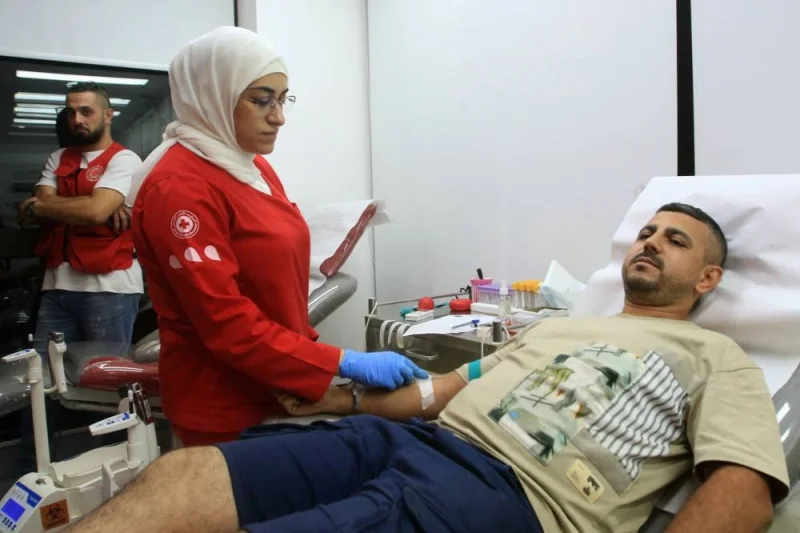
A man donates blood in the southern Lebanese city of Saida on Tuesday, after explosions hit locations in several Hezbollah strongholds around Lebanon. AFP
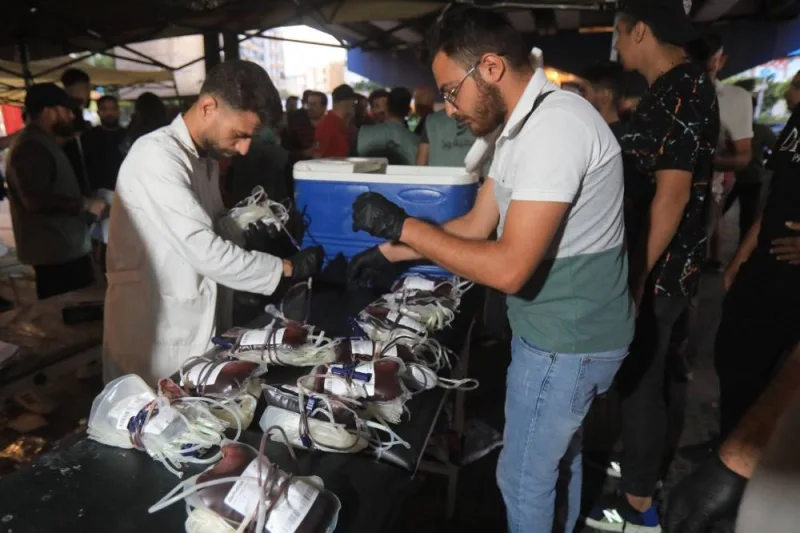
Medics collect blood donations in Beirut's southern suburb on Tuesday, after explosions hit locations in several Hezbollah strongholds around Lebanon. AFP
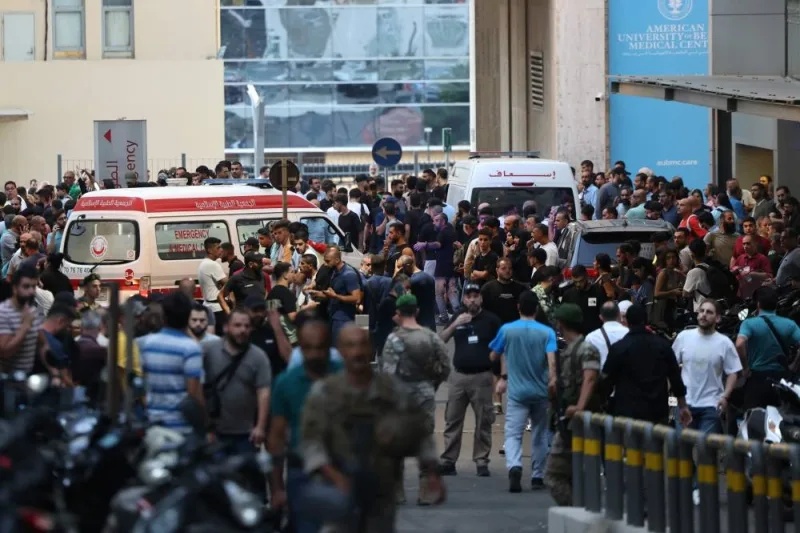
Ambulances are surrounded by people at the entrance of the American University of Beirut Medical Center, on Tuesday, after explosions hit locations in several Hezbollah strongholds around Lebanon. AFP
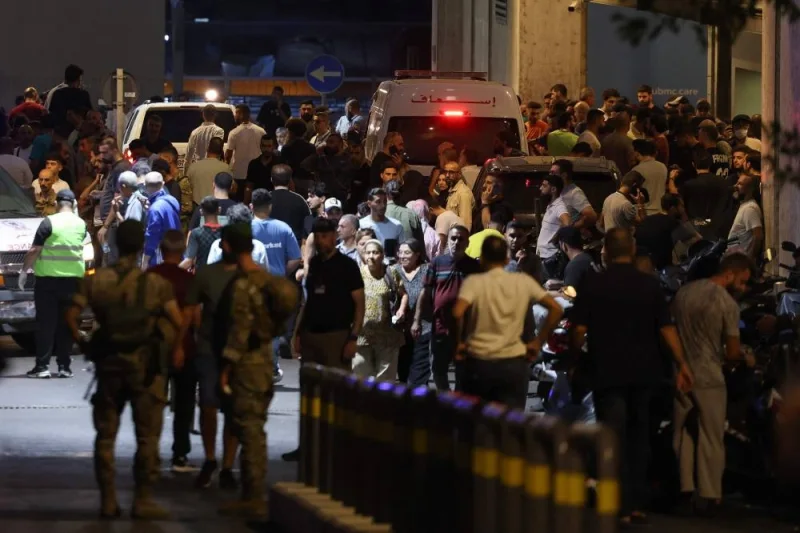
People gather at the entrance of the American University of Beirut Medical Center, on Tuesday, after explosions hit locations in several Hezbollah strongholds around Lebanon. AFP
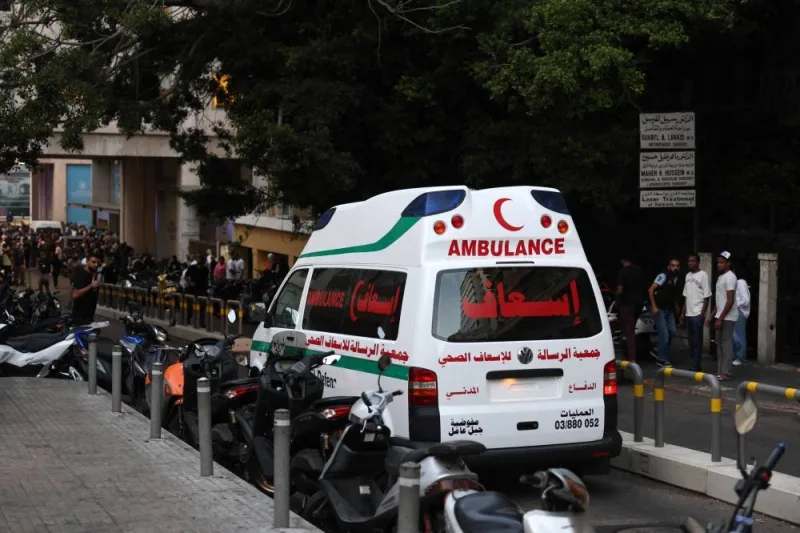
An ambulance rushes wounded people to the American University of Beirut Medical Center, on Tuesday, after explosions hit locations in several Hezbollah strongholds around Lebanon. AFP
Lebanese medics treated Tuesday a stream of wounded people at a hospital car park as others in Hezbollah's southern Beirut stronghold rushed to give blood after group members' pagers had exploded.
Simultaneous blasts of the devices hit locations in several Hezbollah bastions across Lebanon, with the health ministry reporting nine killed and some 2,800 others wounded.
Hezbollah blamed Israel after nearly a year of cross-border exchanges of fire in stated support of Palestinian ally Hamas whose October 7 attack triggered the Gaza war.
At one hospital in Beirut's southern suburbs, an AFP correspondent saw people being treated in a car park on thin mattresses, with medical gloves on the ground and ambulance stretchers covered in blood.
At another hospital in the area, the correspondent saw one person wounded in the face, eye and hand, and another on the side of his waist, with a third person being treated in a car.
"In all my life I've never seen someone walking on the street... and then explode," said Musa, a resident of Beirut's southern suburbs, requesting to be identified only by his first name.
"My wife and I were going to the doctor, I found people lying on the ground in front of me," he said.
"People didn't know what was happening."
The sudden and widespread blasts sparked chaotic scenes across the country, and gruesome videos and images circulated on social media, including people bloodied and wounded at waist level where a pager might be kept, or on their arms, hands and face.
One video, which AFP was unable to independently verify, showed people in a vegetable shop when a blast appeared to come from a man's side, with people scattering and the man falling to the ground.
One witness, requesting anonymity, told AFP he saw a Hezbollah member's pager explode immediately after he received a message on the device.
Under tent structures set up under a bridge in Beirut's southern suburbs, dozens of people crowded to give blood at a hastily set-up donation point as the intermittent sound of ambulance sirens rang out, another AFP correspondent said.
Mostly men were coming to give blood, with full bags lined up on a table and then packed into cold boxes.
Elsewhere in the capital's Hamra commercial district, an AFP journalist saw dozens of people crowded around the entry to one of the city's main hospitals as ambulances rushed to the facility.
On the street near the emergency department, women, some wearing black chadors, and men crowded around and trying to find out news of the wounded.
Some cried or shouted in anger or exasperation and others held their heads in their hands.
One woman was informed by phone that a relative had lost a hand and was wounded in the waist.
Sirens continued to ring out as ambulances kept arriving, some from Lebanon's civil defence or the Red Cross but also other emergency services including the Risala Scout association, which is affiliated with Hezbollah ally the Amal movement.
Soldiers and people in civilian clothing tried to help facilitate the passage of the vehicles, while emergency workers wearing bright vests directed some of the ambulances.
In Lebanon's south, closer to the Israeli border, an AFP correspondent reported dozens of ambulances rushing between the cities of Tyre and Sidon, with hospitals in both cities cordoned off.
An AFP correspondent in eastern Lebanon said dozens of people were wounded in similar incidents in the Bekaa Valley.

AP
The White House said Tuesday it had no involvement in an operation that caused thousands of pagers held by Hezbollah members in Lebanon to explode simultaneously.
Militants in the Iran-backed group blamed the attack, which killed eight and injured 2,750 others, on Israel.
“No, the U.S. was not involved,” White House press secretary Jean-Pierre said. “This was not something that we were aware of, and I’m just not going to go beyond that.”
Hezbollah and Israeli forces have been engaged in cross-border attacks in recent months. The Lebanese militants said Israel was fully responsible for the attack, though Israel declined to comment.
Reuters, citing anonymous sources, said Hezbollah fighters had been using pagers to try and avoid Israeli tracking of their locations.
Those pagers were wielded against them, with images of bloodied and screaming Hezbollah fighters flooding hospitals in Lebanon.
SEE ALSO: Hezbollah hit by a wave of exploding pagers in Lebanon and Syria. At least 9 dead, hundreds injured
Experts called it a remarkable and sophisticated security breach, given the technical savvy needed to sabotage the pagers.
Matt Murphy
BBC News
17.09.2024
Thousands of people have been injured in Lebanon, after pagers used by the armed group Hezbollah to communicate dramatically exploded almost simultaneously across the country on Tuesday.
At least nine people were killed in the blasts, with hundreds more pouring into hospitals across the country. Lebanon's health ministry says at least 2,750 people have been injured, 200 of them seriously.
It is unclear how the attack - which looks to have been highly sophisticated - occurred, though Hezbollah has blamed its adversary Israel. Israeli officials have so far declined to comment.
Here is what we know so far.
When and where did it happen?
The blasts began in southern Beirut and several other areas of Lebanon on Tuesday afternoon at around 15:45 local time (13:45 BST).
Witnesses reported seeing smoke coming from people's pockets, before seeing small explosions that sounded like fireworks and gunshots.
In one clip, CCTV footage appeared to show an explosion in a man’s trouser pocket as he stood at a shop till.
Explosions continued for around an hour after the initial blasts, the Reuters news agency reported.
Soon after, scores of people began arriving at hospitals across Lebanon, with witnesses reporting scenes of mass confusion.
A source close to Hezbollah told AFP that two of those killed were the sons of two Hezbollah MPs. They also said the 10-year-old daughter of a Hezbollah member was killed.
Hezbollah chief Sayyed Hassan Nasrallah was not hurt in the explosions, Reuters reported quoting a source.Pager explosions will devastate Hezbollah's morale and manpower
How did the pagers explode?
Analysts have been quick to express shock at the scale of Tuesday's attack - saying Hezbollah prides itself on its security measures.
Some suggested a hack may have caused the pager batteries to overheat, causing the devices to explode. Such an act would be unprecedented.
But many experts say that is unlikely, with footage of the explosions inconsistent with the batteries overheating.
Some analysts say instead that some sort of supply chain attack, which involved the pagers being tampered with during their manufacture or in transit, was more likely.
Supply chain attacks are a growing concern in the cyber security world with many high-profile incidents recently caused by hackers gaining access to products whilst they are in development.
But these attacks are normally contained to software. Hardware supply chain attacks are far rarer as they involve getting hands on to the device.
If this was indeed a supply chain attack it would have involved a huge operation to secretly tamper with the pagers in some way.
A former British Army munitions expert, who asked not to be named, told the BBC the devices could have been packed with between 10 to 20 grams each of military-grade high explosive, hidden inside a fake electronic component.
This, said the expert, would have been armed by a signal, something called an alphanumeric text message.
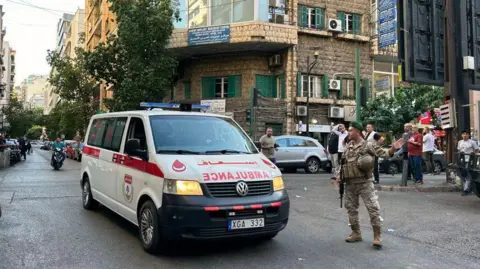
Who is responsible?
So far, nobody has claimed responsibility - though Lebanon's prime minister and Hezbollah have blamed Israel.
Prime Minister Najib Mikati said the explosions represented a “serious violation of Lebanese sovereignty and a crime by all standards”.
In its statement accusing Israel of being behind the attacks, Hezbollah said it held the country "fully responsible for this criminal aggression that also targeted civilians".
"This treacherous and criminal enemy will certainly receive its just punishment for this sinful aggression, whether it expects it or not," it added.
Israeli officials have not commented on the allegations, but most analysts agree that it seems likely it is behind the attack.
Prof Simon Mabon, chair in International Relations at Lancaster University, told the BBC: "We know that Israel has a precedent of using technology to track its target" - but he called the scale of this attack "unprecedented".
Lina Khatib, from the UK-based Chatham House, said the attack suggested that Israel has "deeply" infiltrated Hezbollah's "communications network".

Three women arrive at a hospital in Beirut for news of loved-ones, following the blasts
Why does Hezbollah use pagers?
Hezbollah relies heavily on pagers for the group’s communications.
Mobile phones have long since been abandoned as simply too vulnerable, as Israel’s assassination of the Hamas bomb-maker Yahya Ayyash demonstrated as long ago as 1996.
But one Hezbollah operative told the AP news agency that the pagers were a new brand that the group had not used before.
Emily Harding, an ex-analyst with the CIA, said the security breach was deeply embarrassing to Hezbollah.
"A breach of this magnitude is not only physically harmful, but will also make them question their entire security apparatus," she told the BBC.
"I would expect to see them conduct an intensive internal investigation that will distract them from a potential fight with Israel."
Will the Hezbollah-Israel conflict escalate?
Hezbollah is allied with Israel's arch-nemesis in the region, Iran. The group is part of Tehran's Axis of Resistance and has been engaged in a low-level war with Israel for months, frequently exchanging rocket and missile fire across Israel's northern border. Entire communities have been displaced from both sides.
The blasts came just hours after Israel's security cabinet made the safe return of residents to the north of the country an official war goal.
Prime Minister Benjamin Netanyahu told a visiting US official that Israel would "do what is necessary to ensure its security".
Earlier on Monday, Israel's domestic security agency said it had thwarted a Hezbollah attempt to assassinate a former official.
Despite the ongoing tensions, observers say that until now both sides have aimed to contain hostilities without crossing the line into full-scale war. But there are fears that the situation could spiral out of control, with Hezbollah already threatening to respond to Tuesday's explosions.
Additional reporting by Frances Mao
The long-forgotten communication device has once again come under focus after a series of explosions left more than a thousand people injured in Lebanon.

TRT World
A pager, or beeper, is a small, battery-operated radio receiver that triggers an alert (audible or vibrating) when it receives the proper signal / Photo: TRT World
Following the latest news of several pagers used by Hezbollah militants exploding across Lebanon, interest has emerged in the predecessor of modern cellular phones.
A pager, or beeper, is a small, battery-operated radio receiver that triggers an alert (audible or vibrating) when it receives the proper signal.
It can display either a numeric message, such as a phone number, or a text message if it's an alphanumeric pager – for instance, ‘Call Home’.
Pagers were popular from the late 1980s to the late 1990s. However, by 2000s, smaller, more affordable cell phones with better battery life led most consumers to switch to cellular communication.
There are two main types of pagers: one-way pagers, which only receive messages, and two-way pagers, which can send and receive messages.
Pagers were frequently used in industries like healthcare, emergency services and by reporters due to their reliability.
Over a thousand people were wounded in pager explosions across Lebanon. Hezbollah members and Iran’s ambassador to Lebanon, Mojtaba Amani, were also among the injured.
Sources suggest Israeli involvement through communication system hacks pic.twitter.com/sNTbQ722Bs— TRT World (@trtworld) September 17, 2024
Reliability, privacy features
Pagers, often seen as a relic of the past, continue to serve vital roles, particularly in situations where reliability and urgency are paramount.
Their dependability shines during emergencies when cell networks fail, providing a crucial backup for communication.
Unlike smartphones, pagers are built for critical communication, cutting through the noise of everyday alerts and ensuring that priority notifications are easy to spot.
In addition to reliability, pagers offer a unique set of privacy features.
Since they lack GPS or Bluetooth, they appeal to individuals who prefer to stay "off the grid" without the possibility of location tracking.
They also provide a way to avoid robocalls, as only select contacts typically have access to a pager number, making it an effective communication tool for important or time-sensitive matters.
This level of security, combined with their cost-effectiveness and ability to work in secure environments where cellphones are restricted, makes pagers a practical choice in many industries, from healthcare to high-security government settings.
We live surrounded by networked devices equipped with packs full of potential energy, possibly offering adversaries an unprecedented vector for kinetic attacks.
Thomas Newdick, Tyler Rogoway
Posted on Sep 17, 2024
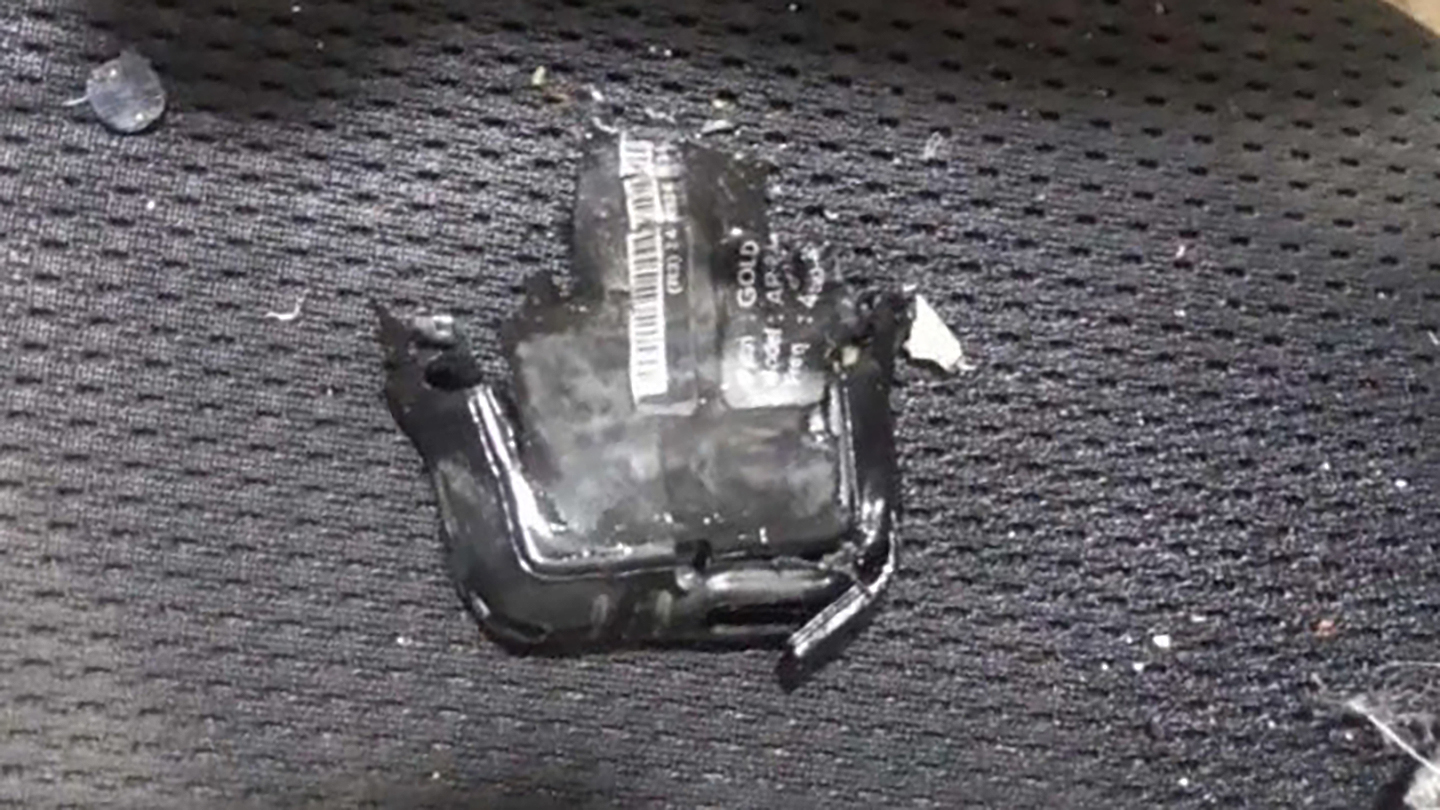
In an extraordinary development in the Middle East conflict, thousands of Hezbollah members have been injured and at least three people were killed after pagers that the militants used exploded simultaneously today. While exactly how this occurred remains unclear, it could very well be a monumental cyber attack that could have widespread implications far beyond the conflict between Israel and Hezbollah. Regardless, it should be a wake-up call.
While no one has so far taken responsibility, Hezbollah has blamed Israel for the attack. A source from the group said that they expect the attack may have been launched in response to an alleged assassination attempt by the Lebanese militant group on a former senior Israeli security official. The existence of that plot was only revealed today by Israel’s Shin Bet security agency.
At this stage, the total number of individuals killed or injured by the pager blasts is unclear. Hezbollah has confirmed the deaths of at least three people, including two of its fighters.
Advertisement
At the time of writing, at least nine people have died and approximately 2,800 have been wounded, according to Lebanon’s Minister of Health Firas Abiad. Of the injured, 170 at least are also said to be in critical condition.

Iran’s ambassador to Lebanon, Mojtaba Amani, was among those injured, according to Iran’s semi-official Mehr news agency.
“Amani has a superficial injury and is currently under observation in a hospital,” a source told the Fars new agency, another semi-official outlet.
Multiple videos posted to social media show scenes of chaos on the streets of Beirut, the Lebanese capital, with ambulances responding to the very many wounded, many of whom had sustained injuries, including burns, to their hands and hips. Similar scenes were played out elsewhere in Lebanon, including the southern city of Tyre, and in villages across the Beqaa valley and south Lebanon.
BREAKING:
Hospitals filling up in Lebanon as hundreds of Hezbollah operatives had their pagers blown up simultaneously pic.twitter.com/Uow3KKlNdd— Visegrád 24 (@visegrad24) September 17, 2024
Other notices were put out to the public, warning them to avoid wireless communication devices, because of the risk of further explosions.
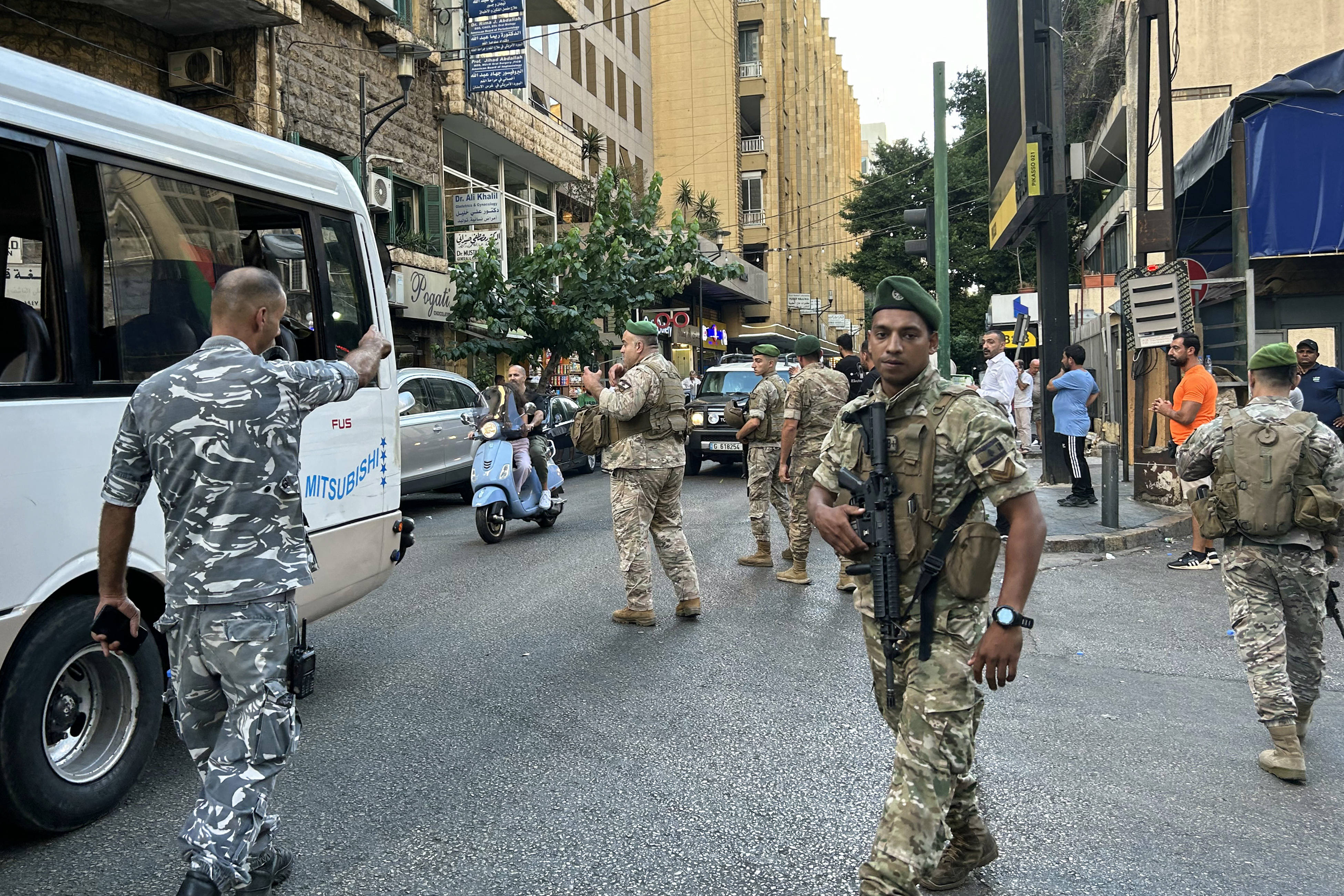
The incidents have led to alarm among Hezbollah, with one official from the group telling Reuters that the pager explosions represented the “biggest security breach” they had faced since the start of the current Gaza war.
Security considerations mean that Hezbollah is responsible for its own discrete communication network and there have been previous concerns that Israel may have managed to penetrate its telecommunications. This speculation, though unconfirmed, has been fueled since October by the assassination of several Hezbollah commanders, with targeting coordinates having been generated for locations that were otherwise considered safe.
Lebanon, and specifically Beirut, has been in Israel’s sights since Hezbollah began a campaign of rocket and drone strikes against Israel almost a year ago, in solidarity with Hamas, after that group launched its surprise invasion on October 7, 2023, starting the current conflict in Gaza
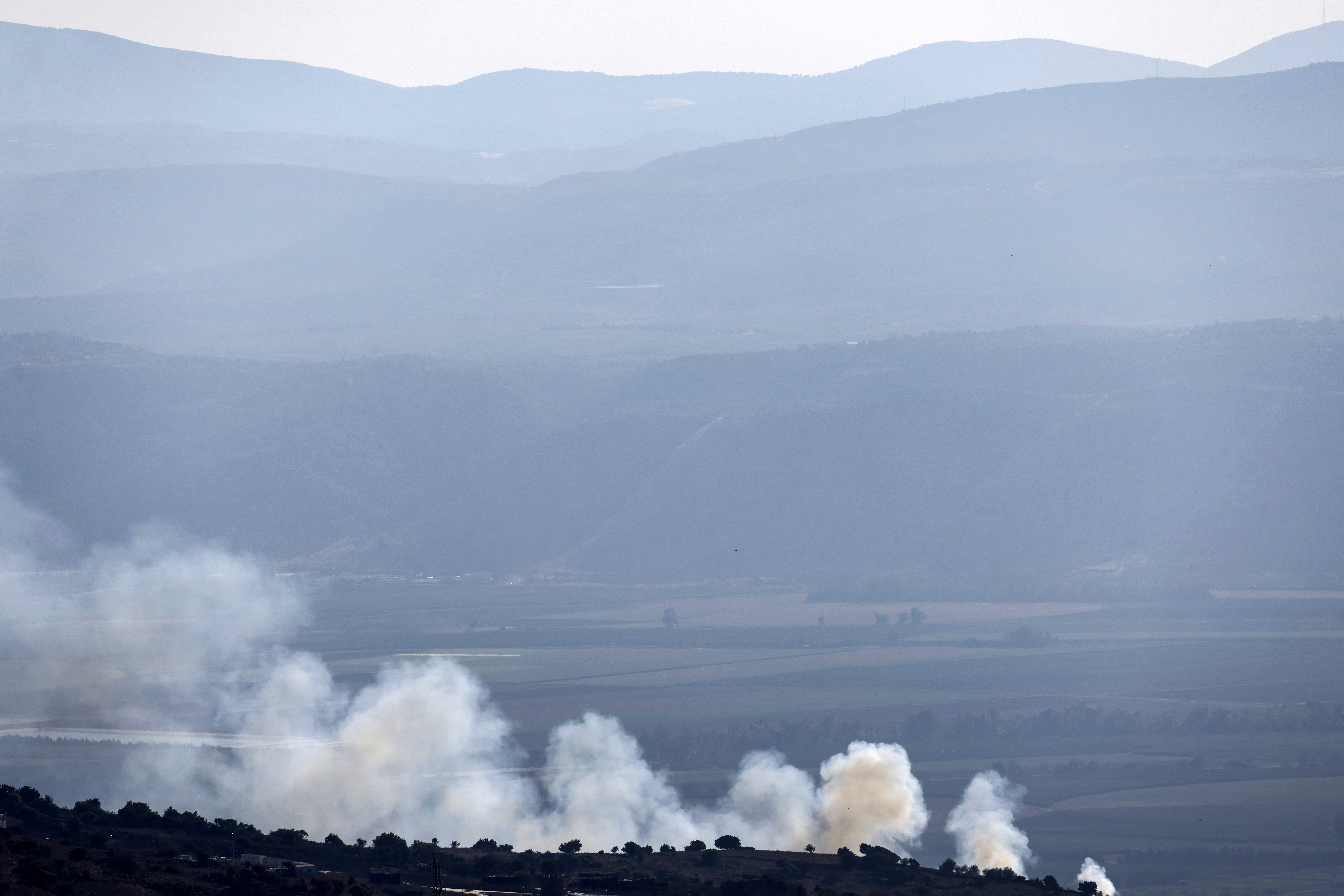
Tensions between Israel and Hezbollah have increased dramatically in recent months, stoking fears of a large-scale conflict breaking out between them.
One key factor in the standoff is Israel’s stated plan to return tens of thousands of Israelis who had been evacuated from towns along the northern border with Lebanon when Hezbollah stepped up its campaign of rocket attacks. With the return of these evacuees now approved by Israeli officials, there have been suggestions that a major military operation may be about to be launched against the militant group.
As well as the evacuations, the fighting between Israel and Hezbollah has so far resulted in hundreds of deaths, most of them from the Lebanese militant group, as well as Israeli civilians and soldiers.
The prospect of a large-scale offensive against Hezbollah isn’t universally supported by Israeli officials. This has led to reports that Israeli Prime Minister Benjamin Netanyahu could be poised to remove Israeli Minister of Defense Yoav Gallant from his post since he is said to oppose such an operation.
In the meantime, Lebanon deals with the bloody aftermath of today’s pager explosions.
Speculation is already growing as to how Israel might have carried out the campaign.
There have been reports, including from three different security sources, that the targeted pagers were from a recent shipment to arrive in Lebanon. If true, that could suggest that they had some kind of malware implanted in them and an explosive charge. This would have required Israel to intercept and alter or swap out the shipments of these pagers, which would be a complex affair, but not one outside of the realm of feasibility.
Considering everyone reading this likely has just such a device in their pocket or hand, and considering the potential vulnerabilities of hardware created overseas, often by possible future adversaries, as well as the software that controls these devices, the alarm bells couldn’t ring any louder, even if this event proves to be something else. We interact every day with examples of networked technology — from the cars we drive to the computer hardware we use to make a living — that also have power packs with large amounts of stored potential energy. So targeting such devices for nefarious kinetic purposes is darkly logical.
When you think about it in that light, the explosive/incendiary charges are already distributed all over the globe by the billions. The possible ability to connect to and trigger those charges is, at least in theory, already built in. Now targeting the right devices and making them actually ignite is another thing, but for some devices, that could be more of a software challenge above anything else. Being able to remotely target individuals via their unique device, which has their electronic fingerprint attached to it, is also an unprecedented concept to comprehend.
A potential kinetic attack opportunity like this has never existed in human history and even an adversary just lighting as many batteries on fire in a target country could cause massive and widespread damage and a near halt to productivity. This is just one of myriad potential cyber attack vectors that could cripple an entire society.
On the other hand, if Israel mettled with the pager hardware directly and this wasn’t just a pure cyber operation, that also points to the potential vulnerabilities in hardware supply channels, which have already been a constant issue of contention.
This is a developing story and we will bring more details as they emerge.
Contact the author: thomas@thewarzone.com and tyler@twz.com
Op-Ed
The Great Pager Detonation: The End of Phones and Computers on Airplanes?
September 17, 2024
Operation Below the Belt” the End of Phones and Computers on Airplanes?: Earlier today, some entity—presumably Israel—caused 3,000 pagers used by Hezbollah to detonate simultaneously.
It was a unique operation and demonstrated both Israel’s technological capabilities as well as its penetration of Hezbollah and Iranian networks.
After all, Iran supplied the pagers to Hezbollah just a few months ago.
The ramifications of the attack, however warranted it was, go far beyond the Middle East, however.
Wifi has become the norm on passenger planes. Whereas airlines once banned Samsung phones due to questions about their safety after reports that they overheated and still do not allow shipment of lithium batteries in the cargo hold, most passengers today bring laptops, cell phones, and tablets onboard flights.
Indeed, on most American aircraft, access to the entertainment system requires the passenger to use his phone, tablet, or computer.
The question for security experts—and certainly one on which Al Qaeda now works—is whether the operation presumably carried out against Hezbollah pagers could be replicated on American or European cell phones or other electronic equipment.
Put another way, who needs box cutters or an underwear bomb to bring down an aircraft if a signal could overheat, if not detonate a couple hundred tablets or phones at 30,000 feet above the Atlantic?
For 23 years, air travelers have had to limit their liquids and submit to vigorous pat-downs as the Transportation Security Agency or its European corollaries sought to protect travelers against the tactics of a past attack.
Today’s demonstration in Lebanon should raise red flags: Are water bottles or computers the greater threat? Do computers or phones have to be on to receive the signal that causes detonation? If not, will airlines ever accept such electronics in carry-on or cargo? If Wi-Fi is necessary to transmit the signal, is that the end of Wi-Fi on flights? And if passengers cannot do work on an aircraft, will they even fly or turn to video conferencing?
Hezbollah might have been today’s target, but today’s events may have the most profound impact on the aviation industry since 9/11.
Israel says halting Hezbollah attacks now official war goal
17 September 2024, 10:44

Israeli officials have repeatedly threatened to take heavier military action to halt the near-daily attacks.
Israel has announced that halting Hezbollah’s attacks in the north in order to allow its residents to return is now an official war goal, as the country considers a wider military operation that could ignite an all-out conflict.
Israeli officials have repeatedly threatened to take heavier military action to halt the near-daily attacks, which began shortly after the outbreak of the nearly year-long war between Israel and Hamas in Gaza.
Israel has regularly launched airstrikes in response and has targeted and killed senior Hezbollah commanders.
As recently as last month it appeared a full-blown war was imminent.
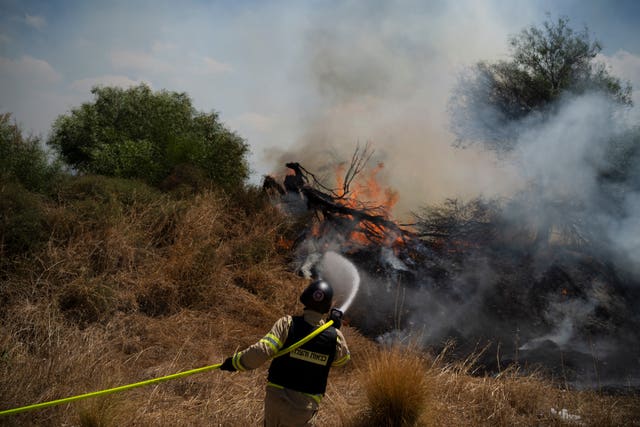
The tit-for-tat strikes have displaced tens of thousands of people on both sides of the border. Hezbollah has said it would halt the attacks if there is a ceasefire in Gaza, but those talks have repeatedly bogged down.
The United States has pressed for restraint even as it has rushed military aid to Israel, warning its close ally that a wider war would not achieve its goals.
Israeli media has meanwhile reported that Prime Minister Benjamin Netanyahu is considering firing defence minister Yoav Gallant and replacing him with a politician seen as far more hawkish.
That would be the biggest leadership shakeup in Israel since Hamas’s October 7 attack triggered the war in Gaza and set off wider regional tensions.
The announcement on Lebanon came after Israel’s security Cabinet met late into the night. It said the Cabinet has “updated the objectives of the war” to include safely returning the residents of the north to their homes.
“Israel will continue to act to implement this objective,” it said.
US envoy Amos Hochstein, who has made several visits to Lebanon and Israel to try to ease tensions, met with Mr Netanyahu on Monday.
Mr Hochstein told the prime minister that intensifying the conflict with Hezbollah would not help achieve the goal of returning Israelis to their homes, according to a US official.
Mr Hochstein said Mr Netanyahu risked sparking a broad and protracted regional conflict if he moved forward with a full-scale war in Lebanon and said the Biden administration remained committed to finding a diplomatic solution in conjunction with a Gaza ceasefire or on its own, the official said.

Mr Netanyahu told Mr Hochstein that residents cannot return without “a fundamental change in the security situation in the north,” according to a statement from the prime minister’s office.
It said that while Mr Netanyahu “appreciates and respects” US support, Israel will “do what is necessary to safeguard its security”.
Mr Gallant has meanwhile said the focus of the conflict is shifting from Gaza to Israel’s north.
He told US defence secretary Lloyd Austin this week that time is running out for an agreement with Hezbollah, saying “the trajectory is clear”.
Hezbollah has said that while it does not want a wider war, it is prepared for one.
Raed Berro, a member of Hezbollah’s parliamentary bloc, said that the militant group “is ready for confrontation and has a lot in its pocket to deter the enemy and protect Lebanon in case Netanyahu thinks of expanding the war”.
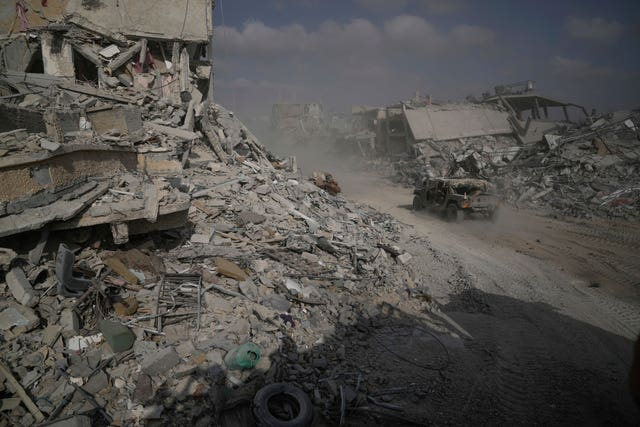
The war in Gaza began when Hamas launched a surprise attack into southern Israel, killing some 1,200 people and taking another 250 hostage. Militants are still holding around 100 captives, a third of whom are believed to be dead, after releasing most of the rest during a ceasefire last year.
Israel’s retaliatory offensive has killed more than 41,000 Palestinians, according to Gaza’s Health Ministry, which does not specify how many were fighters but says just over half were women and children.
The Israeli bombardment and ground invasion have devastated large areas of the densely populated enclave and driven around 90% of its 2.3 million residents from their homes.
Iran supports Hamas, Hezbollah and other militant groups across the region, which have carried out strikes on Israeli and US targets in solidarity with the Palestinians.
A missile launched by Yemen’s Iran-backed Houthi rebels on Sunday set off air raid sirens in central Israel without causing casualties.
Israel has hinted at a military response.
Israel and Iran traded fire directly for the first time in April, and Iran has threatened to avenge the killing of Hamas leader Ismail Haniyeh in an explosion in its capital in July. The targeted killing was widely blamed on Israel, which has not said whether it was involved.
The United States, Qatar and Egypt have spent most of this year trying to broker an agreement in which Hamas would release the hostages in exchange for a lasting ceasefire, a full Israeli withdrawal from Gaza and the release of Palestinians imprisoned by Israel.
President Joe Biden endorsed the framework of the agreement in May and the UN Security Council backed it days later. But since then, both Israel and Hamas have accused each other of making new and unacceptable demands, and the talks appear to be at an impasse.
No comments:
Post a Comment